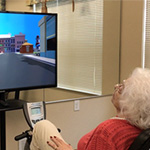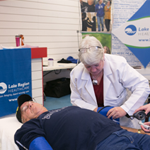Current Projects

Geriatrics Workforce Enhancement Program (GWEP)
The University of Minnesota received a five-year, $3.74 million award of federal funding from the Health Resources and Services Administration at the U.S. Department of Health and Human Services - Geriatrics Workforce Enhancement Program (GWEP). The Minnesota Northstar GWEP is led by an inter-professional team, including the the School of Nursing.
Building Trust and Reducing the Burden of Stroke in African American Communities
Dr. Niloufar Hadidi is currently looking at cardiovascular health disparities which persist among African Americans despite advances in risk factor identification and management. Stroke has been identified as the largest contributor to disparities in life expectancy in African Americans. In Minnesota in 2016, the death rate from stroke was 26% higher in African Americans compared to whites. However, there is a lack of consensus on best practices on intervention efficacy. Dr. Haidi’s project proposes a community academic partnership to build trust, explore strategies to engage the communities around promoting stroke risk factor reduction and further explore barriers to behavioral change and solutions to overcoming stroke disparities.
Exergame

Be part of an exercise and virtual reality cognitive training study. Dr. Dereck Salisbury’s
study tests how a 3-month exercise and virtual reality cognitive training program affects cognition and fitness in people who want to improve their memory. Click here for more information.
Incontinence-Associated Dermatitis Assessment Tool

Professor Donna Bliss developed a graphical tool that provides color representations of varying severities of incontinence-associated skin damage on different colors of skin. The laminated tool identifies the different regions where damage often occurs and provides detailed images of each severity level. This tool is the only one of its kind to have undergone psychometric testing by nurses.
Ready-Steady

Siobhan McMahon is leading this NIH-funded study to identify effective strategies for promoting physical activity among older adults with fall risk. The approach used in this study is guided by the engineering-inspired Multiphase Optimization Strategy (MOST) framework, which will enable the research team to examine the unique and combined effects of key intervention strategies. McMahon’s overarching goal is to develop community-based interventions whose behavior change content effectively helps older adults to incorporate physical activity into their everyday lives. This study will be completed in late 2022.
Past Projects
Exploring Non-Pharmacological Treatments for Post Stroke Depression
Dr. Hadidi’s research focuses on using problem-solving therapy, to improve cognition and depressive symptoms in older stroke survivors. She uses brain imaging to explore the impact of problem solving therapy on the activation of neural pathways for cognition and depression.
A Community-based Exercise Program to Improve Walking Outcomes in Peripheral Artery Disease: The GAIT Trial
Dr. Ryan J. Mays created community-based exercise programs to improve walking ability and quality of life in people with peripheral artery disease. His exercise program used an innovative approach of detailed training, monitoring, and coaching (TMC) that reflects patients’ perspectives. The study was presented as Best of Science at the Society for Vascular Medicine in 2019. He is currently working on the publication.
Aerobic Exercise for Older Adults with Alzheimer’s disease
Dr. Fang Yu wanted to know if exercise can delay the progression of Alzheimer’s disease in older adults. She conducted several studies to develop and test a cycling intervention that has shown promising improvements in cognition. She conducted a clinical trial to examine the effects of aerobic exercise on cognition and brain structure in community-dwelling older adults with Alzheimer’s disease.
PAD PRAIRIE Initiative

The University of Minnesota School of Nursing partnered with Lake Region Healthcare and Otter Tail County Public Health Department in Fergus Falls, Stevens Community Medical Center in Morris, and other rural communities to improve the health and mobility of older adults with peripheral artery disease (PAD) through the PAD PRAIRIE Initiative directed by Professor Diane J. Treat-Jacobson.
Defeating Urinary Incontinence with Exercise Training (DUET)
Dr. Kristine Talley wants to know if urinary incontinence can be improved in frail community-dwelling older women by strengthening their pelvic floor and improving their mobility. In her recent pilot study, older women who did pelvic floor muscle exercises, twice-weekly strength training classes, and scheduled walking reduced their daily incontinent episodes by fifty percent.